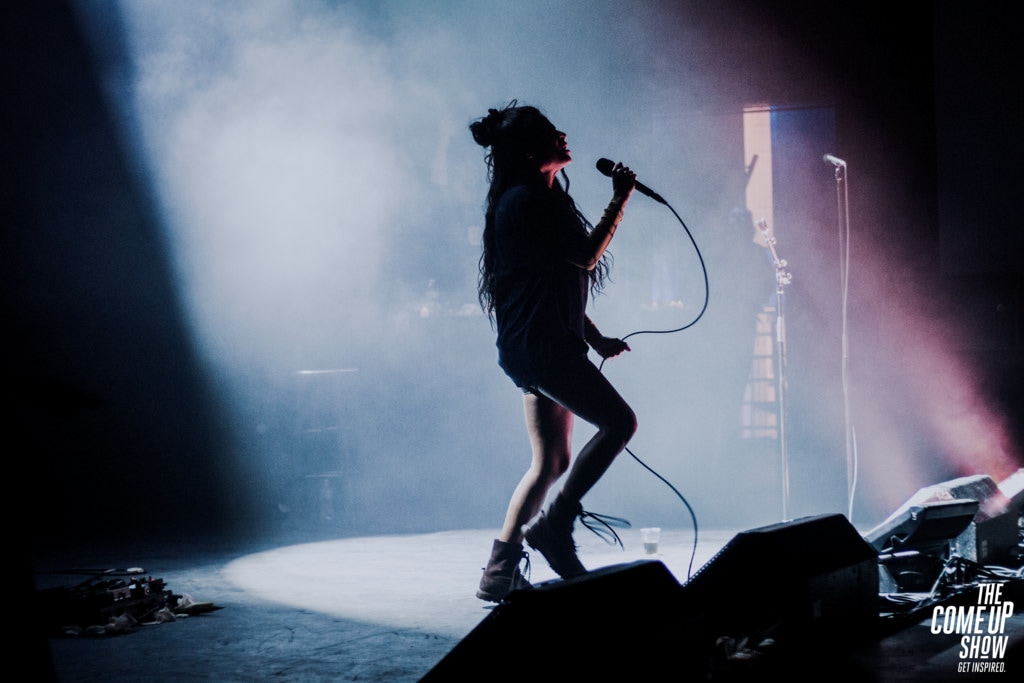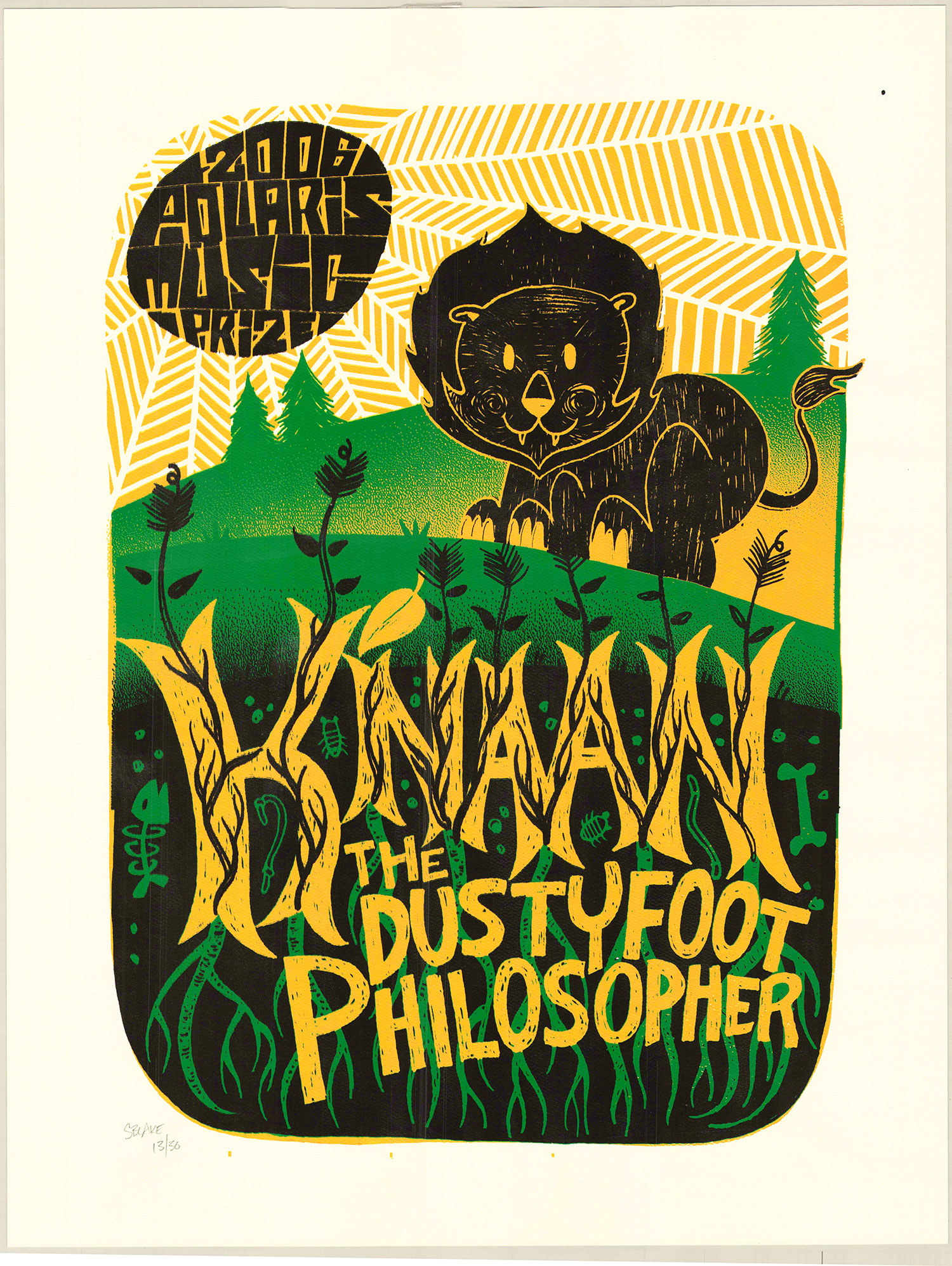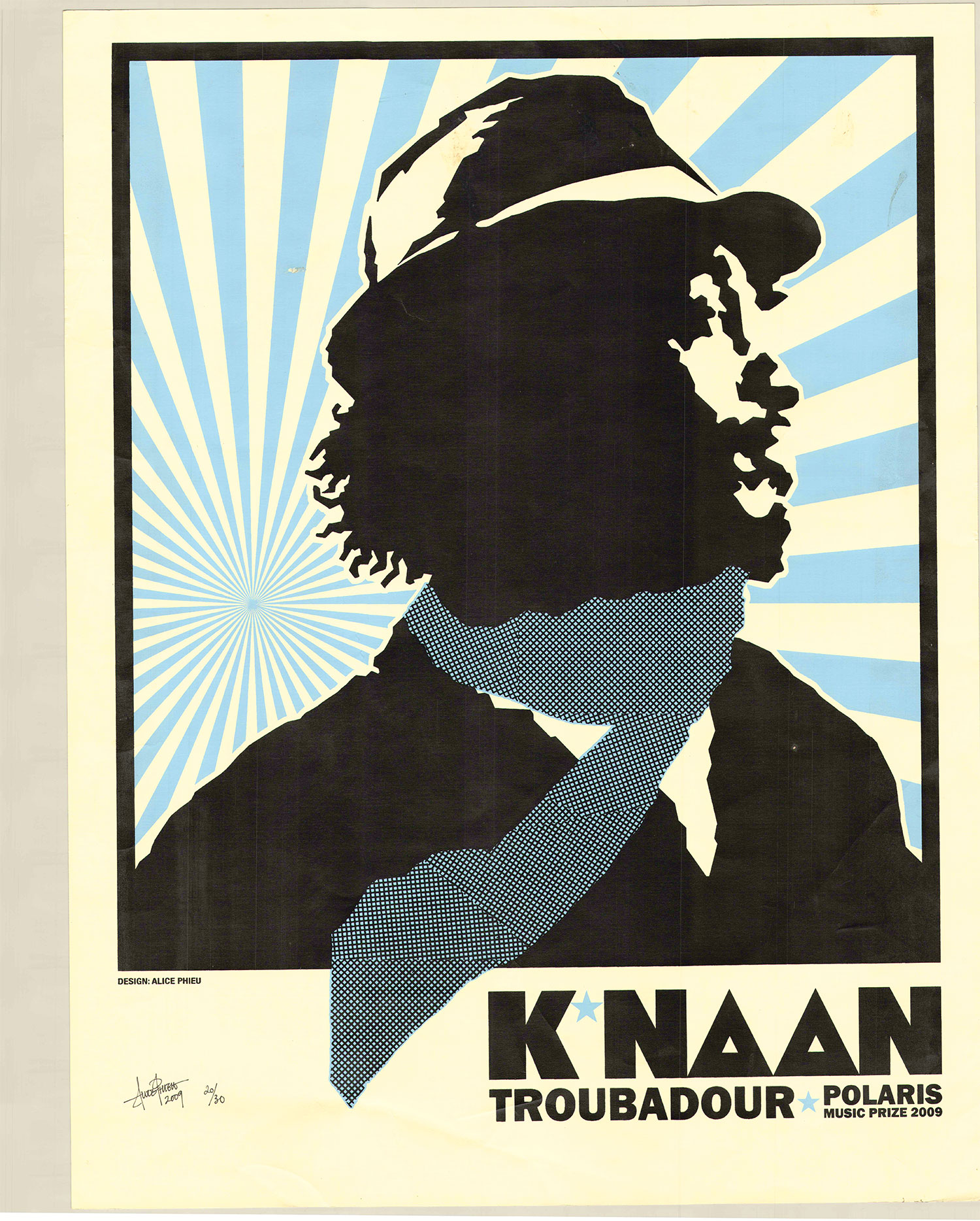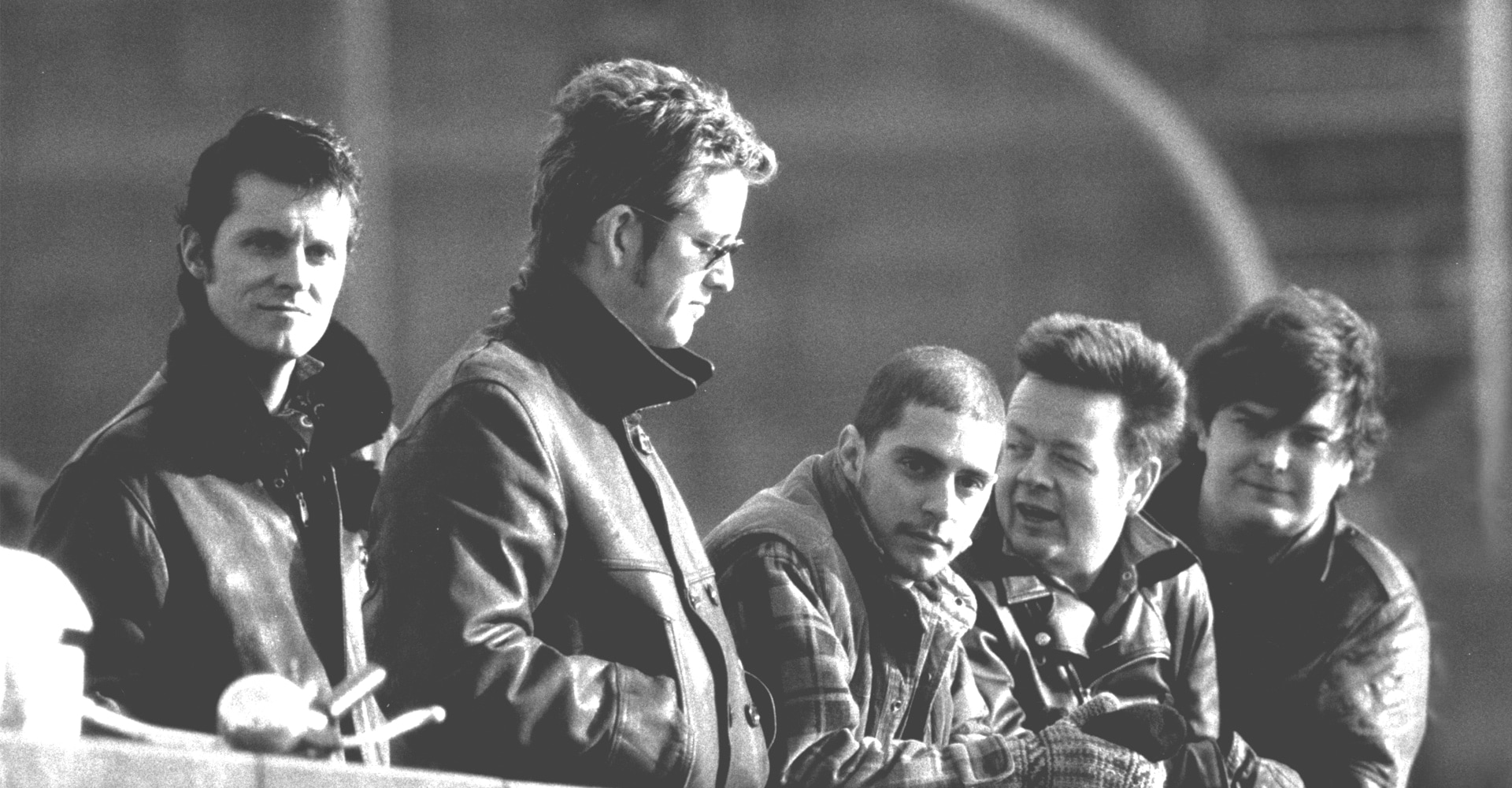
In 1999, AfroFest's Artistic Director, Nadine McNulty, dropped by Rexdale's Somali Hall of Fame music store to ask the owner if he knew of any new local Somali singers or music acts.
A young man followed her out, introducing himself, "I’m a Somali artist and I’d like to get in on this.”
After a few meetings and coaching sessions, McNulty booked him to sing at AfroFest 2000. Held at Queen's Park in central Toronto, the largest free North American African music festival celebrated the diversity of African music and culture.
On that very rainy day, K'Naan made his debut concert performance, one decades in the making. This first Toronto appearance was only overshadowed by the global success by his 2008 song, "Wavin' Flag."
Out of Mogadishu
Born in 1978 in Mogadishu, Somalia, K'Naan (born Keinan Abdi Warsame) experienced the horrors of the country's civil war. Raised by his mother and aunt Magool, a celebrated Somali singer, music and poetry were an important element of his upbringing.
But, beginning in the late 1980s, the violence of Somalia's civil war transformed K'Naan's childhood.
Before a war there is a wind of violence and you start to see the apprehension in people, the refusal to go out late at night.
Those little things…there’s no school today, for some reason.
—K'Naan, Interview with Toronto Life, December 2008
One day after school, K'Naan and his friends were washing their school chalk tablets, when they picked up what they thought was a potato.
It was a grenade.
The pin came out, and K'Naan threw it away as far as he could. It blew up half the school. Miraculously, no one was injured.
Hoping to avoid any additional violence, K’Naan’s mother was able to secure exit visas for herself and her two children on the last day before the U.S. Embassy in Somalia closed in 1991.
At the young age of 13, K'Naan caught the last commercial flight out of Somalia as the nation plunged into decades of civil war.
Little Mogadishu
K'Naan spent time in Harlem, New York before settling in Toronto’s Rexdale neighbourhood, the city's "Little Mogadishu." Associated with the "Dixon Crew", a Toronto gang, K'naan was arrested numerous times and often experienced racial profiling. While in Toronto, K'Naan also witnessed gang violence, saw fellow Somalis face deportation from Canada, and lost friends to suicide.
During this period, K’Naan dropped out of high school in Grade 10, and at 18, decided to travel. Throughout this period, K'Naan never stopped writing.
I wasn't going to spend my life running from the cops and living in these bad neighbourhoods. I didn't leave Somalia to make another Somalia for myself in Canada.
—K'Naan
So for me, Canada has played both the saviour and the villain, especially at the beginning, during the time of integration and assimilation.
— K'Naan, interview with Maclean's Magazine, 2010
Becoming the Troubadour
K'Naan eventually landed in Washington, D.C. and became immersed in the city's groundbreaking spoken word scene. Around the same time, he gained prominence for his poetry posted on Somali websites.
In 2001, his travels took him to Europe, where his friend and Canadian music promoter Sol Guy got him in front of the United Nations Commission for Refugees (UNHCR).
The occasion was the 50th anniversary of the 1951 Refugee Convention and K'naan's text had been carefully vetted. However, he went rogue and added a verse about the failed UN mission to Somalia.
Shockingly, he was met with a standing ovation led by African singer, Youssou N'Dour, shouting "magnificient" over and over again. K'Naan recorded and toured with N'Dour's band for the rest of the year.

A pivotal moment for K'Naan came in writing "Soobax", a bilingual (English and Somali) song, the title of which means "come out." Recorded on his debut album, "The Dusty Foot Philosopher", the song was used in the soundtrack for the FIFA 06 video game (released in 2005). Illustration by Scott Blake, courtesy of the Polaris Music Prize

In 2008, K’Naan released the album "Troubadour", doubling down on his style of autobiographical songs mixed with pop-African rhythms. It was also shortlisted for the Polaris Music Prize. The album included musical collaborations and cameos with Mos Def, Damien Marley, Adam Levine, and Kirk Hammett. Illustration by Alice Pheu, courtesy of the Polaris Music Prize
Listen: Soobax
What to do?
Where to go?
I got to be a refugee
damn, soobax— Music and lyrics by K'Naan
This online exhibition uses third-party applications including Spotify and YouTube. Check with your organization’s web administrator if you are unable to access content from these channels in the exhibition.
Just Like a Wavin' Flag
K'Naan's 2008 album,Troubadour, included the original version of his "Wavin' Flag", a song inspired by a poem by his grandfather, Haji Mohammad, a well-known Somali poet. K'naan would later retell the story of the song's origins in his 2012 children's book When I Get Older: The Story Behind "Wavin' Flag."
In response to the devestating 2010 earthquake in Haiti, K'Naan recorded a remix of "Wavin' Flag" with 57 artists, including Drake, Broken Social Scene, Jim Cuddy of Blue Rodeo, The Arkells, and Justin Bieber. The single won a JUNO Award and, more importantly, raised over one million dollars in relief funding.
Coca-Cola picked up on the success of the single and selected "Wavin' Flag" as the official anthem for the 2010 FIFA World Cup in South Africa. It skyrocketed K'Naan to international fame and the song to the top of the charts in 18 countries.
For the World Cup version, K'Naan rewrote the lyrics to include 17 African dialects. He also remixed the lyrics to reflect the celebratory nature of the World Cup.
Listen: Wavin' Flag
Give me freedom
Give me fire
Give me reason
Take me higher— K'Naan, "Wavin' Flag"
This online exhibition uses third-party applications including Spotify and YouTube. Check with your organization’s web administrator if you are unable to access content from these channels in the exhibition.
Country, God
or the Girl
In December 2012, K'Naan wrote a self-critical op-ed in The New York Times two months after the release of his studio album Country, God or the Girl. In the article, K'Naan reflected on his rise to fame in North American music: how his music had slowly shifted away from mention of Somalia and his family's experiences there.
Although the album featured some of the top names in music, K'Naan accused himself of trying to hard to appeal to North American fans. At the end of the op-ed, K'Naan promised himself that his music going forward would not disregard the themes that were important to him, even at the expense of fame.
Country, God or the Girl was K'Naan's last studio album for over eight years.
When I write from the deepest part of my heart, my advisers say, I remind people too much of Somalia, which I escaped as a boy...
I come with all the baggage of Somalia — of my grandfather’s poetry, of pounding rhythms, of the war, of being an immigrant, of being an artist, of needing to explain a few things. Even in the friendliest of melodies, something in my voice stirs up a well of history — of dark history, of loss’s victory.
—K'Naan, The New York Times, December 8 2012

K'Naan surprised audience members when he joined Nelly Furtado on stage during Toronto's WE Day Concert at the Air Canada Centre in 2012. They performed their song "Is Anybody Out There?".
Photo by Michael Rajzman
K’Naan currently lives in New York City but visits Toronto often to see his family. In 2017, President Donald Trump issued a travel ban, which prohibited entry to the United States from several countries, including Somalia. K'Naan was advised not to travel to Canada, for fear that he would not be allowed to return to United States.
That same year, composer Lin-Manuel Miranda put together a new music video for the song "Immigrants (We Get the Job Done)" that had been featured on The Hamilton Mixtape, a 2016 album of songs from the musical Hamilton performed by various artists. Featuring K'Naan, Miranda wanted to include artists who could speak to their experiences with systemic racism.
Watch: Immigrants
Watch the music video for the song "Immigrants", which features K’Naan, Snow tha Product, Riz MC, and Residente. The song also samples “Yorktown (The World Turned Upside Down)” from Lin-Manuel Miranda’s award-winning Broadway musical Hamilton. The video is a visual metaphor for the song's lyrics, depicting the varied experiences of newcomers to the United States.
This online exhibition uses third-party applications including Spotify and YouTube. Check with your organization’s web administrator if you are unable to access content from these channels in the exhibition.

Official music video for Immigrants (We Get The Job Done) by K'naan featuring Residente, Riz MC & Snow Tha Product. Please note: this third-party video does not provide closed captions.
View Transcript[A man walks through a dark metallic passage on a train. He sits in a small room and turns on a radio. In another scene, numerous people in another section of the train cluster together, also listening to a radio. The camera pans to numerous sections of the train, which feature people working at sewing machines, kitchens. The train transforms to a New York City subway train. Various singers sing in different parts of the train.]
[Spoken on radio]
You know, and it gets into this whole issue of border security
You know, who's gonna say that the borders are secure?
We've got the House and the Senate debating this issue
And it's, it's really astonishing that in a country founded by immigrants
"Immigrant" has somehow become a bad word
So the debate rages on and we continue
[Rapping begins]
And just like that it's over, we tend to our wounded, we count our dead
Black and white soldiers wonder alike if this really means freedom
Not yet
I got one job, two job, three when I need them
I got five roommates in this one studio, but I never really see them
And we all came America trying to get a lap dance from Lady Freedom
But now Lady Liberty is acting like Hilary Banks with a pre-nup
Man, I was brave, sailing on graves
Don't think I didn't notice those tombstones disguised as waves
I'm no dummy, here is something funny, you can be an immigrant without risking your lives
Or crossing these borders with thrifty supplies
All you got to do is see the world with new eyes
Immigrants, we get the job done
Look how far I come
Look how far I come
Look how far I come
We get the job done
Look how far I come
Look how far I come
Look how far I come
Immigrants, we get the job done
It's a hard line when you're an import
Baby boy, it's hard times
When you ain't sent for
Racists feed the belly of the beast
With they pitchforks, rich chores
Done by the people that get ignored
Ya se armó
Ya se despertaron
It's a whole awakening
La alarma ya sonó hace rato
Los que quieren buscan
Pero nos apodan como vagos
We are the same ones
Hustling on every level
Ten los datos
Walk a mile in our shoes
Abróchense los zapatos
I been scoping ya dudes, ya'll ain't been working like I do
I'll outwork you, it hurts you
You claim I'm stealing jobs though
Peter Piper claimed he picked them, he just underpaid Pablo
But there ain't a paper trail when you living in the shadows
We're America's ghost writers, the credit's only borrowed
It's a matter of time before the checks all come
But
Immigrants, we get the job done
Look how far I come
Look how far I come
Look how far I come
We get the job done
Look how far I come
Look how far I come
Look how far I come
Immigrants, we get the job
Not yet
The credit is only borrowed
It's America's ghost writers, the credit's only borrowed
It's America's ghost writers
America's ghost writers
America's ghost writers, the credit's only borrow-borrowed
It's America's ghost writers, a credit is only borrowed
It's America's ghost writers, a credit is only borrowed
It's America's ghost writers, a credit is only borrowed
It's
Immigrants, we get the job done
Ay yo aye, immigrants we don't like that
Na they don't play British empire strikes back
They beating us like 808's and high hats
At our own game of invasion, but this ain't Iraq
Who these fugees what did they do for me
But contribute new dreams
Taxes and tools, swagger and food to eat
Cool, they flee war zones, but the problem ain't ours
Even if our bombs landed on them like the Mayflower
Buckingham Palace or Capitol Hill
Blood of my ancestors had that all built
It's the ink you print on your dollar bill, oil you spill
Thin red lines on the flag you hoist when you kill
But still we just say "look how far I come"
Hindustan, Pakistan, to London
To a galaxy far from their ignorance
'Cause
Immigrants, we get the job done
Por tierra o por agua
Identidad falsa
Brincamos muros o flotamos en balsas
La peleamos como Sandino en Nicaragua
Somos como las plantas que crecen sin agua
Sin pasaporte americano
Porque la mitad de gringolandia es terreno mexicano
Hay que ser bien hijo de puta
Nosotros les sembramos el árbol y ellos se comen la frutas
Somos los que cruzaron
Aquí vinimos a buscar el oro que nos robaron
Tenemos mas trucos que la policía secreta
Metimos la casa completa en una maleta
Con un pico, una pala
Y un rastrillo
Te construimos un castillo
Como es que dice el coro cabrón?
Immigrants, we get the job done
Look how far I come
Look how far I come
Look how far I come
We get the job done
Look how far I come
Look how far I come
Look how far I come
Immigrants, we get the job done
Look how far I come
Look how far I come
Look how far I come
Immigrants, we get the job done
Not yet
Dive Deeper
K'naan. When I Get Older: The Story Behind Wavin' Flag. Toronto: Tundra Books, 2012.
Rima Berns-McGown. Muslims in the Diaspora: The Somali Communities of London and Toronto. Toronto: University of Toronto Press, 1999.
From Mogadishu To Dixon: The Somali Diaspora in a Global Context. eds. Abdi M. Kusow and Stephanie R. Bjork. New Jersey: Red Sea Press, 2008.


